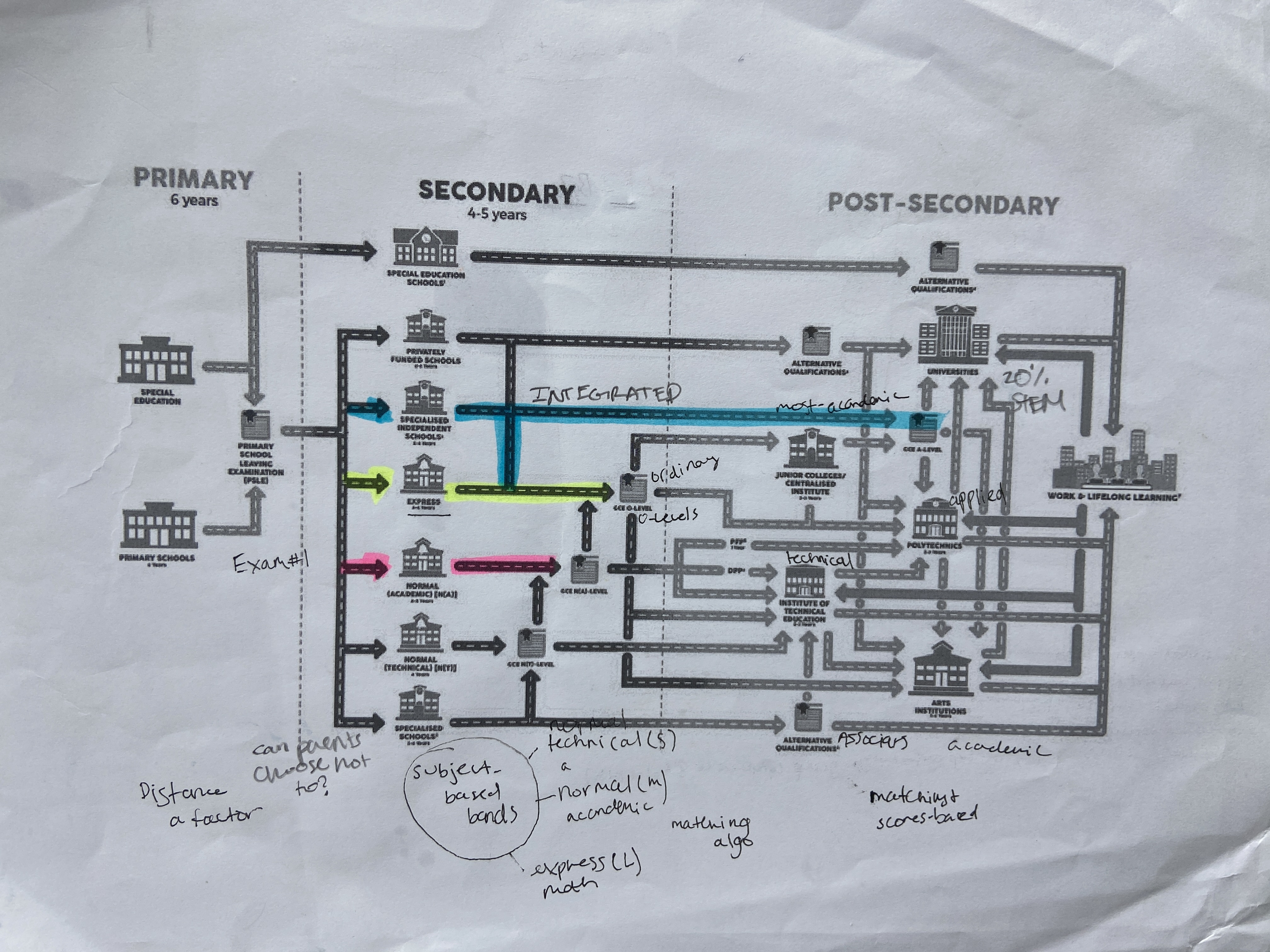I was always drawn to Singapore for its innovation. Moving here, I am not disappointed. In one app and one click I can do my taxes, pay my utilities, book a doctor’s appointment, and if I had gone to school here, pull up all my grades from 20 years ago! This design is very human, and efficient. In less than 60 years, Singapore went from a poor island, about half of the population illiterate, to one of the world’s fastest growing powers.
I’m writing this out of my own curiosity and seek to understand the tradeoffs and affordances of different education systems. My work, building an innovative school and developing a set of microcredentials for 21st century skills, has exposed me to different ways of communicating diverse human potential, and now that I've seen other pathways and how it lights students up it's hard to unsee this potential.
These are my observations and perceptions from conversations and research (mostly on Reddit) if you have an opinion that isn’t represented here--I would love to hear it to gain a richer picture on the education reality.
So as I began diving into the education system here, efficiency came up a lot! Whether or not efficiency is a stated value anywhere by the Ministry of Education, it becomes clear by the choices and stories told in the culture about what society cares about.

If the goal is to scale up really fast, and make something that reliably works, you wind up with something that looks like Singapore’s education system. As Shiyan Koh explains here, Singapore has been running the efficiencyOS which has gotten the nation to where it is today, it caught up to other developed countries in just one generation. It’s safe, the playbook of “sit down and grind→get good grades” worked for them to get out of poverty and they want to pass that down to their kids.
The school system of the efficiencyOS ensures safety and prosperity for the children and the country. If you look at this flow chart my new Singaporean friends have graciously helped me make sense of, you see the efficient machine’s core competency. “A winnowing” as Sanjay Sarma terms it in his book Grasp.

“By blowing air through a column of crushed seeds, a winnower can separate seeds from their shells, or grain from chaff..an entire factory devoted to producing near-identical grains on an industrial scale not by molding or shaping, but by eliminating deviance. When building such a device, the question is always what level of error is acceptable. How much good grain is worth throwing out in order to achieve next to no chaff in the final product? It’s hard to pinpoint precisely how much raw human potential the global educational winnower routinely sacrifices for the sake of consistent product, but there’s every reason to believe the wastage is vast: a world’s worth of attrition parceled out most visibly in rejection letters and underwhelming test scores, but also in less obvious forms: courses never taken, applications never sent, examinations never sat for, books never read.”
At the end of each phase of education students take a national exam. The first of these exams is at the end of Primary 6 (when students are ~11 years old) called the PSLE (Primary School Leaving Exam). The results of these exams are used to winnow students into different learning tracks and determine what schooling options are available in the next phase of education.
Looking at this flowchart, it’s very clear for me to spot the operational efficiencies: matching kids into schools takes away the cost of “enrollment”, keeping kids in neat tracks enables the teacher to focus, to maintain large class sizes (~40:1) they require an obedient class etc.
In digging into this question I was glad to learn, this winnower appears to be transparent and meritorious. I learned ten percent of disadvantaged students in Singapore are in the top-performing group compared to an OECD average of three percent (in reading specifically). My hypothesis was that advantaged students would have more resources to afford tutoring services and hence score higher on these tests and receive better opportunities. While this may still be the case, this finding tells me that even the base level education available to the working class will find the “gem” in the winnower.
This winnower flowchart has become world-class in identifying and preserving one type of learner or worker. The values that this system perpetuates that come to mind for me are:
These values take you far in the EfficiencyOS because when there’s a clear path established, like the stepping stones to become a doctor, lawyer, or accountant you can accelerate toward them with sheer willpower and cramming.
The overriding narrative I’ve heard is about conventional forms of success. Friends told me in school they thought there were only 4 jobs: doctor, lawyer, engineer, and accountant. I heard stories of people who became a doctor because they had all A’s, and “that’s the path you take when you have all A’s”. Or someone who went down the arts track and eventually became a lawyer because that was the only “prestigious” path available once you had chosen to study the arts.
You won’t create something extraordinary by following objectives because we don’t know what the stepping stones are yet.
Where are the stories about people creating new things? There are seemingly all these kids who are ambitious and smart but won’t create anything new because the stories in society push them toward the very established path (doctors, lawyers, engineers, and accountants).
These established paths got Singapore to this stage, but they won’t move it into the age of the DiscoveryOS, to do something extraordinary, or even frankly to solve tomorrow’s challenges. Here's how Shiyan describes the DiscoveryOS.
“By definition, discovery means we do not know the answer. It acknowledges that predicting game-changing success is near impossible. Therefore, a system that optimizes for discovery accepts that there will be failures and near-misses far more often than successes.”
A playbook for the values of the DiscoveryOS that I love, comes from the 1517 Fund. Danielle and Michael have become world-class at identifying talent most likely to tackle these game-changing challenges (these ones require a bit more explanation than the values of the efficiencyOS).
Looking at the values of each operating system, you might think the 2 are incompatible. How can you develop the agency to find something you’re passionate about when your path is decided for you? How do you lean into the Friday night dyson sphere when the cultural norms all around you are to spend Friday night studying for exams?

Of course, Singapore has ambitious goals for making the efficiencyOS compatible with the discoveryOS, and they’re doing it through incremental change. A stated goal of the Singapore Education System (as per this overview doc) is to:
“help cultivate in our students qualities such as creativity, collaboration, and compassion--life skills that are essential in a rapidly changing world. Through nurturing the joy of learning and encouraging “entrepreneurial dare’, our students can develop the intrinsic motivation to explore and discover their interests as well as pursue their passions.”
By 2024, those blue, yellow, and pink “streams” in the flow chart will no longer be separate paths limiting student choice (and beliefs about themselves 😅). The MOE is beginning to roll out subject-based bands which will allow students to CHOOSE which level they want to study different subjects at, instead of being sorted into one track based on a composite of your test scores.
According to the Minister of Education (in a recent cna segment):
“We should not reduce our students to a one-dimensional score. Our students are diverse. They have diverse dimensions of abilities, and we want them to know that different people have different strengths. Now, you can say that I'm good at this and I want to do it at a higher level. I'm not so strong at this, I want to do it at a lower level…it also allows them to be in better control of their own learning journey.”
I’m excited to see how this (incremental!) autonomy will change student’s perceptions on their own learning.
Still, from my conversations, just updating the flowchart will not make the DiscoveryOS compatible with the efficiencyOS the nation is currently running on. The values and stories we tell in society have to broaden. There’s a reason why startup hubs in the US are usually liberal cities, as PG said, “it’s because liberal cities tolerate odd ideas, and smart people by definition have odd ideas.” When these odd ideas and unique pathways to success begin to embed themselves in the culture, young people will be more empowered to exercise their agency. Parents, and people from older generations will see more stories of people becoming successful, happy, and contributing to society in new ways.
My hope for Singaporean students is that the high pressure and cramming will start to fade. When students have more autonomy over their path, they will choose to spend less time studying for exams, giving the brain space to wander and explore their areas of passion. When you read stories of the “genius” a lot of times it came from pure boredom that a passion would arise. Thou shalt use this time to create cool things!
(a generative space I'm using to explore this question, I'd LOVE to hear other thoughts and ideas. Let's jam!)